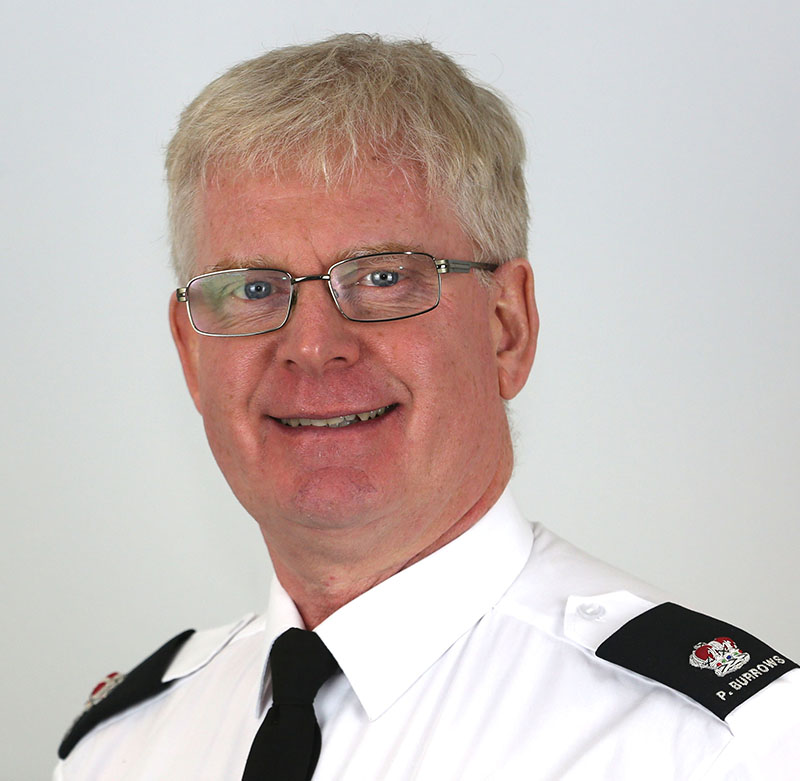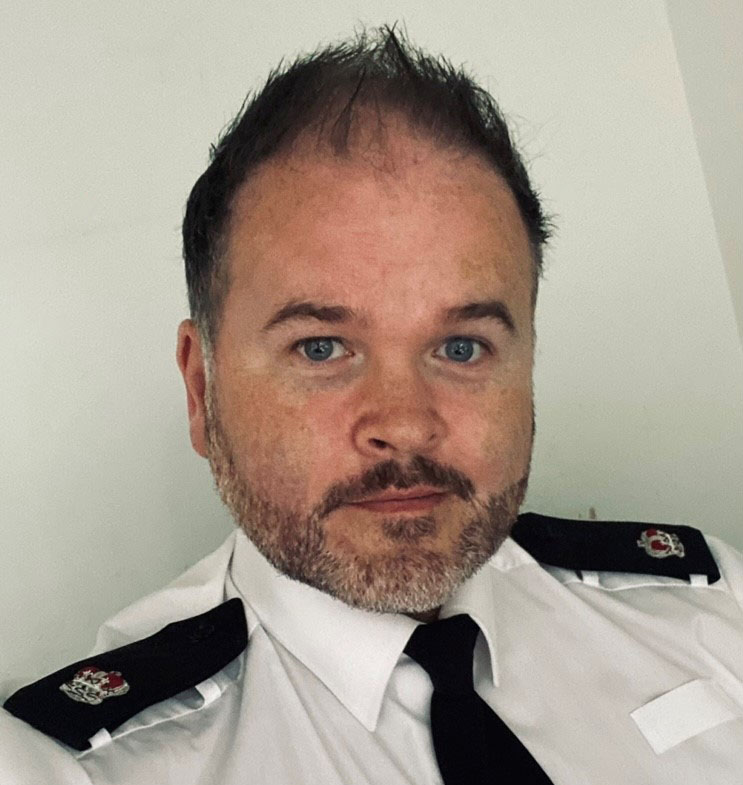Nottinghamshire Police Superintendent Paul Burrows is Disability Lead for the Police Superintendents’ Association. To mark Disability Pride Month, Supt Burrows shares his thoughts and experiences of neurodivergence in the workplace.
I’m very open about the personal challenges I face when it comes to my neurodivergence. My message is however a positive one, in that being neurodivergent does give me different abilities and indeed a different outlook on life that can if nothing else makes me laugh at the oddities I perceive. Additionally, networking with others who are neurodivergent has opened friendships that I haven’t had before, with people who understand where I am coming from without me having to explain myself or the way I think.
So, to me. I have a diagnosis of dyslexia and am currently going through the formal process of being assessed for being autistic and having ADHD.

I say this because I believe I am one of hundreds within the police workforce living with these conditions, but unfortunately, I am probably one of the few that feels able to share this. Not enough people have a medical diagnosis to help understand why life can feel harder than it should, and as a profession I don’t believe we ask enough questions to better understand and support our people. If we don’t understand our people, how can we begin to understand the needs of our communities?
To start, we have a huge untapped resource out there – in the people we haven’t proactively recruited into policing, and in the potential within our own people which is not being harnessed because we are not utilising the best of their abilities. Now, knowing who I am, I can look at my work and my life differently, which has been a real positive for both me and all those around me, I like to think.
Before I became a police officer, much of my career focus was around disability and inclusion. From volunteering to working for charities and a local council, I found a passion for creating opportunities for those with disabilities.
Because of this, I was 30 before I joined the police – a ‘late’ joiner compared to many.
My belief is that policing is a career to which many people who are neurodivergent are attracted, as research suggests conditions like dyslexia align with a strong sense of empathy. There is also a perception that policing will attract those who are autistic, because of the way our brains work as problem-solvers.
For me, each day at work is utterly exhausting, but probably for different reasons than you’d expect. Yes, I’m extremely busy as we all are, but I also find that throughout the day, I ‘act’. I am not being my true self. I am incredibly uncomfortable in busy social situations, I dislike physical contact so I hate shaking people’s hands, I find making conversation with people I don’t know difficult, and long meetings are impossibly difficult for me. I therefore must be someone I’m not, to engage in all these ‘normal’ parts of working life that are expected in our workplaces.
I am lucky to have a number of adjustments to my working life that support my specific needs. My office is purposely dim in lighting with no distractions whatsoever on the walls, I have software on my computer to help me with typing, and I have started to tell my colleagues when I’ve reached ‘burnout’ in meetings. Let’s face it – who wouldn’t want shorter meetings?
I cannot imagine what it would be like to have none of this understanding and to carry on with my work hiding or not even being aware of all of this. However, that is the reality for many of our colleagues, and it should not be.
Within Nottinghamshire Police, my own Force, we screen all new starters for dyslexia. We are finding indicatively about 20% have scores that are suggestive of dyslexia. This is a significant percentage and something which must be key to our understanding of our workforce and our responsibility to support them.
I believe that the work we have already done and the results we have achieved in-Force, have made the working environment for neurodivergent people better – and in some cases, much better – enabling them to flourish. There are real positives in doing this work and continuing to do it.
Thankfully, we are talking more and more about neurodivergent conditions such as these, and when I carry out training within my Force, I regularly hear and see people ‘reverse diagnosing’ themselves because they can relate so closely to the challenges of autism, ADHD or dyslexia they hear about in others. In my view we should be screening for autism and ADHD as standard in the same way we screen for dyslexia – however, post-screening support if there were a positive indication is a thorny issue we are trying to resolve.
Our workforce has undergone the biggest wholesale change in its history in the last two years, as we’ve recruited 20,000 new officers into the service at one time. It’s critical that we work to understand the protected characteristics of these colleagues, how we support those who have a visible or invisible disability, and how we support those who are going through a diagnosis, or are in need of one.
Currently, many of our fundamental processes are not geared up to be inclusive for those who are neurodivergent. I am a Superintendent and have only ever passed one interview in my entire policing career.
I was very lucky to be selected on what was the accelerated promotion scheme after my first few months of work, which took me up to Chief Inspector rank. I passed my interview for Superintendent, but know I was nowhere near the ‘top’ of the applicants who passed in terms of interview scoring, and I’m in no doubt that if standard interviews had been the key to my career progression, I would have failed. That’s because interviews are virtually impossible for me. For me, the format of the questions and the pressurised environment cause mental overload, and would get the worst reflection of me as a police officer and as an individual, not the best.
In our Force, we allow all interviewees to have sight of the questions 10 minutes before they will be asked. Senior officers have said that when this first happened, it prompted the most successful interview cohort they had ever had. This doesn’t only need to be for colleagues with disabilities or neurodivergence – it should be for all. Surely our goal is to allow people to show us their best.
This is also the case with exams. Every person will interpret a question differently, but this is even more stark in those with dyslexia. Many would also be aware that very basic things such as the layout of the sentences on a page, or the format a question is presented in, can pose massive problems for people with dyslexia. The ’justified’ sentence structure is terrible for someone who is dyslexic because if you’re skipping lines unconsciously, it’s almost impossible to find your place in the text again. Exams should be a test of knowledge, not of interpretation, so I’m pleased that these are now being reviewed to be far more inclusive to all.
We should also not forget the mental health and wellbeing impact of living with a neurodivergence. If you are autistic, you are seven times more likely to commit or attempt suicide – a shocking statistic. Anyone who is diagnosed – and this is happening in adulthood far more often today – is at the start of a long journey. For me, the realisation of my autism and ADHD made all the battles I have faced over the years make sense. Now, despite my career in policing nearing its end, I am resolutely focused on making sure that the service is more accommodating of people who are neurodivergent and who have disabilities, and that it proactively seeks to employ more people with these conditions, who have so much to offer. We should ask questions of our recruits – current and potential – and offer them roles that suit their unique needs and abilities.
So, my call to everyone reading this would be to consider your colleagues:
- Consider the officer who continually stays to work late as they’re trying to get things done – are they battling an impossible workload, or are they actually struggling to complete administrative tasks at the speed of others and trying to hide this?
- Consider the colleague who is constantly doodling in a meeting – are they being rude, or are they using a tactic to help them concentrate?
- Consider the colleague who does not want to attend the leaving ‘do’, despite being a friend of the department – are they ‘anti-social’ because they’re no fun, or because large social occasions are incredibly difficult for them?
If we understand, we can support. If we can support, we become an environment that really is welcoming for all. ∎
This blog was originally published on the PSA website – it is reproduced here with kind permission of the author

